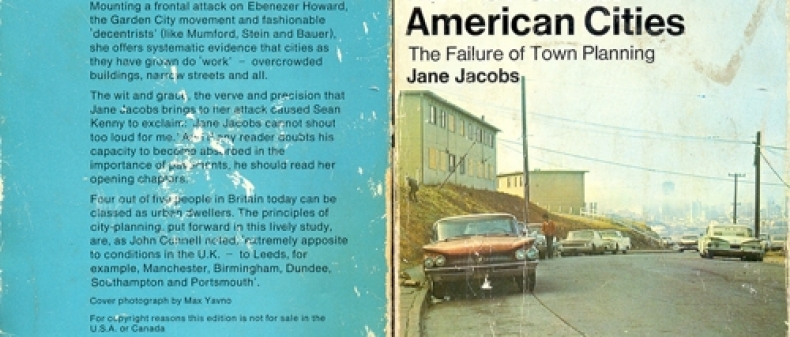
Jane Jacobs published The Death and Life of Great American Cities over 50 years ago, changing radically the way city planners and architects do their jobs. She has become a mythic – some might even say sacred – icon, credited with turning the planning profession on its head. But now, as cities grow and evolve in unpredictable ways, some are beginning to question the relevance of her work.
We talk to Timothy Mennel, a senior editor for the American Planning Association and co-editor of the book Reconsidering Jane Jacobs, about the legacy and the myth.
The Death and Life of Great American Cities has had a profound influence on urban planning practices across the globe. Do you think Jacobs’s ideas are as relevant today as they were when the book was published?
Yes and no. The world has of course changed tremendously in the more than 50 years since the publication of Death and Life, and sometimes it’s hard to relate the neighbourhoods and situations described in Death and Life to our own. As diverse as New York was at that time, today’s cities are far more so, and they face a host of economic challenges that are of a different scale and character than what she focused on in that book. For example, the erosion of the industrial economy, the development of global supply chains, and the rise of China as an economic powerhouse are just a few of those changes.
Nevertheless, Jacobs’s major contribution to planning and countless other fields was to stress the importance of fine-grained attention to all the social and economic qualities that make up a community–and the importance of that hasn’t decreased at all. What will be interesting to see, though, is how our notions of “community” change as our larger frameworks do.
In 2009, Rotterdam held a three day Jane Jacobs festival. Why do you think her work has been such an inspiration to planners and policy makers in the Netherlands?
It seems to me that Jacobs does and doesn’t resonate in the Netherlands. On the one hand, there seems to be a strong sense of collective identity, as well as a strong belief in the necessity of working together toward common ends. Without large-scale cooperative projects, the better part of the country would be under water.
It’s also very densely settled (if relatively homogenous), so people have an intrinsic awareness of their neighbours and their needs. On the other hand, the major force behind those collective efforts is, in the end, the state–small communities aren’t going to build enormous seawalls or develop national industrial policies. The Dutch seem to believe in the power and ability of the state to intervene wisely, while Jacobs was leery of state control and intervention.
What other cities around the world have been influenced by Jacobs ideas?
Probably every North American city has felt Jacobs’s influence–or at least the influence of the backlash against centralized, top-down planning that she came to embody. Interestingly, Jacobs’s lesser-known economic thinking is being borne out now in cities that are struggling to retain or re-create their economies. She wrote on the importance of “import substitution”–which is what happens when a community stops buying other cities’ products and produces its own–and we’re definitely seeing a new localism today in places like Detroit, St. Louis, and other post-industrial cities. Whether those efforts credit Jacobs explicitly or not, I think it’s creating real change on the ground in the way that “listening to communities”–which is the more stereotypical Jacobsian activity–doesn’t always.
Jacobs emigrated to Toronto in the 1960s and instantly plunged into a fight to stop the building of the Spadina Expressway. Do you think she played a part in the eventual cancellation of the project?
It’s ironic, because one of the reasons that Jacobs moved to Toronto was to escape her own celebrity. In the wake of Death of Life, she found that she had less and less time to focus on her writing–and as Jamin Rowan shows in his essay in Reconsidering Jane Jacobs, she saw herself first and foremost as a writer. She was really intent on writing her next books and found that the clamour of community organizing in New York was getting in the way. Nevertheless, she was already becoming an iconic symbol of resistance to state-sponsored plans.
I’m not an expert on the Spadina project, but my understanding is that Jacobs played more of a symbolic than an actual role in many of the planning controversies in Toronto during the time she lived there. Spadina was already hotly contested by the time she moved there, and it seems entirely possible that events would have unfolded in the same way without her. I would say that, similarly, Jacobs’s role in the cancellation of the Lower Manhattan Expressway was notable in terms of publicity but not decisive in terms of policy or funding–the story of that project is simply too complex to give all the credit (or blame) for its cancellation to one person.
Tell us something that we may not have known about Jane Jacobs?
One of the biggest myths about Jacobs is that she fought some sort of epic war with Robert Moses, who was the leading figure in much of the postwar construction of New York City. Moses was a convenient target for her rhetoric, but he and Jacobs barely ever dealt with each other directly. She and others used him as a rhetorical symbol of a kind of planning that she no longer believed in, but he had already lost much of his power by the time of Death and Life, and she doesn’t seem to have been much on his mind at all–hardly the stuff of epic battles.
Do you think Jacob’s legacy will live on?
Of course. However, I think that in the long run her economic ideas will be more enduring than her community ones, which are rooted in the conflict between individuals (or communities) and the state. It may be different in Canada, but in American cities–as the Occupy movement is making clear–the perceived enemy for people on the left now is less often the state than capitalism itself. (People on the right, as the Tea Party movement shows, tend to feel the reverse.) It seems to me that Jacobs tended to oppose the state but endorse the economy–at least local economies–making her more of a libertarian than a socialist. If the move toward anti-corporate localism prevails, Jacobs’s influence could come to be seen in a whole new way.
Timothy Mennel will be involved in a discussion “Jane Jacobs Undone” at the University of Toronto’s Isabel Bader Theatre (93 Charles Street West) on Thursday, February 9thfrom 6:30 — 8:00 pm. RSVP for the event here.
SÃle Cleary writes about architecture and city stuff for Toronto Standard. Follow her on Twitter at @silecleary.
For more, follow us on Twitter at @torontostandard, and subscribe to our newsletter.














